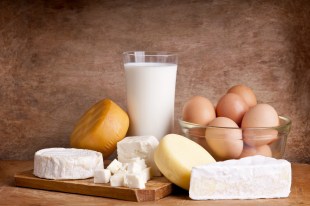Vitamin B2 or riboflavin is a water-soluble vitamin that mainly functions as an essential component of coenzymes flavin mononucleotide and flavin adenine dinucleotide. These coenzymes are both crucial for the conversion of protein, fat and carbohydrate nutrients into energy. This energy fuels repair of tissues that were damaged due to direct trauma or diseases. Riboflavin also plays a major role in thyroid hormone metabolism, which influences your overall metabolism and energy production. It’s also necessary for the formation of red blood cells, antibody production and recycling of glutathione, a free radical scavenger. Vitamin B2 is needed to activate vitamin B6 or niacin.
As a water-soluble vitamin, only small amounts of riboflavin are stored as reserves in the liver, kidney and heart; thus, a constant supply is needed. Vitamin B2 deficiency is rarely an isolated case as it is usually a part of a multi-nutrient deficiency. Insufficient supply of riboflavin may cause anemia, chapping of the lips, cataracts, fatigue and malignancies. Intake of foods rich in riboflavin, such as lean meats, dairy products, liver, whole grains, seaweeds, green leafy vegetables, legumes and nuts can prevent vitamin B2 deficiency.
Why do we need vitamin B2 as we age? What are its actions and will it slow aging or prevent disease?
Riboflavin is needed by your body only in minute amounts; however, this B-vitamin is important in achieving optimal health and in delaying the process of aging. Riboflavin prevents a number of age-related health conditions, such as heart disease and cancer, by scavenging free radicals. Theories suggest that the age-related changes in your body are partly caused by excessive free radicals, which can cause irreversible damages to your tissues and DNA. In addition, its antioxidant properties reduce your risk of cataracts by preventing oxidative damages to your eyes’ lenses. It promotes repair of tissues which are damaged by diseases and long-term exposure to toxic chemical compounds. Sufficient riboflavin intake keeps your nails, hair and skin healthy. It also strengthens your immune system by enhancing the production of antibodies.
Can I get enough vitamin B2 in my food?
The daily recommendation for riboflavin is sufficiently met by regular intake of foods high in riboflavin. Lean meats, green leafy vegetables, whole grains, soybeans, legumes, nuts and dairy products are excellent sources of riboflavin. Most cereal products and flour are fortified with riboflavin.
If I’m to supplement with vitamin B2, in what form should I take it?
Riboflavin is usually included in multivitamins and in B-complex vitamins. It is also sold individually in tablet forms.
What dose of vitamin B2 should I take?
The RDA for riboflavin is around 1.0-1.6 mg. For vitamin B2 supplementation, a dose of up to 50 mg per day is recommended.
Are there any risks with supplementing with Vitamin B2?
Riboflavin is generally safe if taken in appropriate amounts. Intake of large doses may cause diarrhea, increased urine output, itching, numbness, burning sensations, yellow or orange urine and increased sensitivity to light.
Are there any special requirements when I take this?
Vitamin B2 is best absorbed if taken in between meals. Take each dose with a full glass of water.
Does vitamin B12 need other compounds to accompany it for optimal absorption?
Riboflavin is best taken with B-vitamins and vitamin C for better absorption. During riboflavin supplementation, the amount of B6 vitamin should be the same as the amount of vitamin B2.
If I supplement with vitamin B2, do I need to take this in divided doses?
Vitamin B2 supplements are taken in divided doses daily.
Can I test so as I know whether I’m deficient in vitamin B2 or to ascertain that I’m taking the correct dose for me?
RBC glutathione reductase activity is measured to detect riboflavin deficiency. Riboflavin deficiency is suggested by increased stimulation of reductase activity.
What is the best source of Vitamin B2?
Vitamin B2 or riboflavin is best obtained from foods with high amounts of riboflavin. Mushrooms, calf liver and spinach contain riboflavin in high concentrations. Natural food sources are preferred over dietary supplements because they contain a wide variety of vitamins and nutrients needed for optimal health without the risk of toxicity. Supplementation must be considered if the deficiency is it is caused by an existing medical condition.
Last Reviewed: 09-Jun-2011
Ann-Mary Amber
Latest posts by Ann-Mary Amber (see all)
- This is why gut health is so important - 24/02/18
- Best antioxidants for skincare - 18/09/17
- CoQ10 health benefits - 09/07/17







